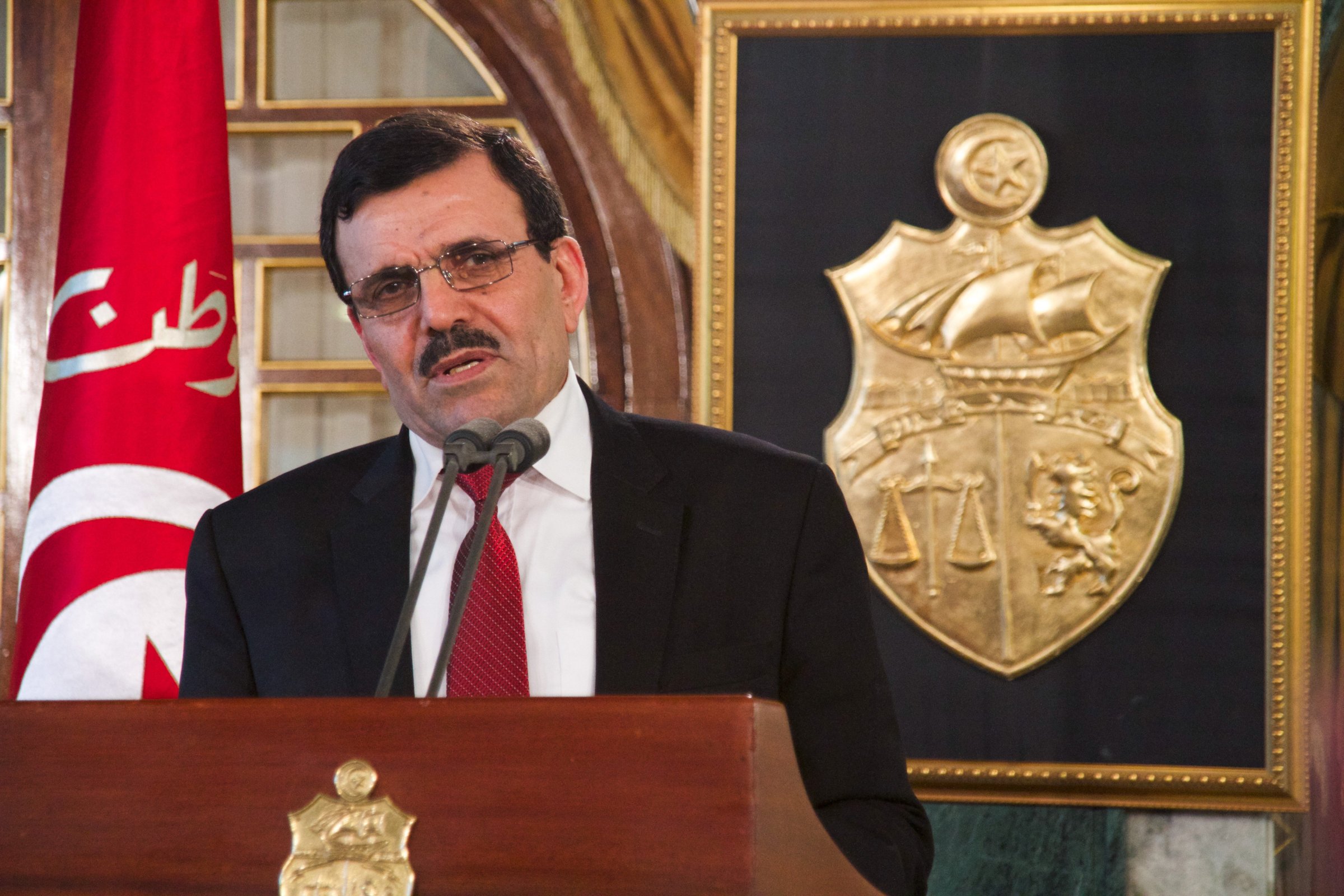
Tunisia’s Islamist Prime Minister resigned Thursday, setting in motion the plan to end the political impasse that has hobbled the country’s transition to democracy. After months of political wrangling, Tunisia’s ruling Islamist party is poised to peacefully hand over power—a sign of compromise that has been woefully absent elsewhere in the region.
Tunisia, the birthplace of the “Arab Spring” in early 2011, has struggled to find its footing since the ouster of the autocratic President Zine el-Abidine Ben Ali, even as it avoided the bloodshed that plagued other post-revolution Arab countries, most notably Egypt. The moderate Islamist party Ennahdha was swept into power in 2011 elections for an interim government, but then came under mounting criticism for failing to improve the sputtering economy and ensure security. The interim regime repeatedly missed deadlines for drawing up plans for a permanent democracy, and the deadlocked government was headed into an existential crisis.
But an agreement mediated by the powerful UGTT, the country’s largest labor union, between the government and the largest opposition parties finalized late last year suggests a new start. Under the plan, the Islamist-led government will relinquish power to a cabinet of technocrats ahead of a new round of elections. In exchange, the ruling party has demanded that the current legislature select the members of the board that will oversee the 2014 elections for the parliament and president — completed this week — and finalize the country’s new constitution, which it is slated to finish voting on by Jan. 13. “As I promised to a short while ago … I have just submitted the government’s resignation,” Prime Minister Ali Larayedh told reporters Thursday, according to al-Jazeera. “I hope the country will be a model for democratic transition.” Political parties agreed last month — albeit well after the initial Nov. 1 deadline for the negotiations — that Mehdi Jomaa, the current minister of industry who has no stated political affiliation, will assume Larayedh’s post in the new interim government.
But a government of technocrats is no panacea for a country at a crossroads. In one of his last moves before announcing his resignation, Larayedh suspended a new tax hike on vehicles after two days of protests in several cities that stirred clashes with police, the latest in a series of demonstrations fueled by the poor economy. More than 15 percent of Tunisians are unemployed, and that figure is even higher in the country’s interior — including the city of Sidi Bouzi, where a disgruntled street vendor set himself on fire in Dec. 2010 and instigated the initial wave of protests that sparked the Arab Spring. International lenders are all the while demanding more cuts to the government budget, which reached nearly 7 percent of GDP last year, according to Reuters.
Tunisian authorities are also combating extremist Islamists who have gained a foothold in the country since the end of the police state under Ben Ali. The military is battling militants in the remote mountains along the Algeria border, and the government has linked the Islamist group Ansar al-Sharia – which the U.S. designated a terrorist group Friday – to a rare suicide bombing in the resort town of Sousse and to two political assassinations in the past year that shook the nation.
To make matters more difficult, the technocratic interim government will not have the electoral mandate to tackle Tunisia’s most pressing issues. That means that while Tunisia’s secular opposition will welcome the demise of Ennahdha rule, the country may have to hold out for new elections, still months down the line, before it sees the reforms it badly needs. “We have to wait for the next government for the implementation of the real structural reforms in the economic and social fields,” Selim Kharrat, director of the government watchdog al-Bawsala, told TIME in an interview in November as the political negotiations were underway. “Politicians have to be aware that they cannot take their time.”
More Must-Reads from TIME
- Donald Trump Is TIME's 2024 Person of the Year
- Why We Chose Trump as Person of the Year
- Is Intermittent Fasting Good or Bad for You?
- The 100 Must-Read Books of 2024
- The 20 Best Christmas TV Episodes
- Column: If Optimism Feels Ridiculous Now, Try Hope
- The Future of Climate Action Is Trade Policy
- Merle Bombardieri Is Helping People Make the Baby Decision
Write to Noah Rayman at noah.rayman@time.com